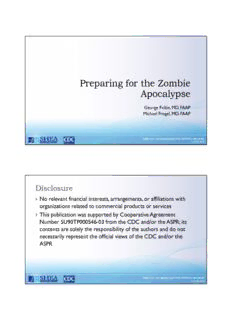Table Of ContentPreparing for the Zombie
Apocalypse
George Foltin, MD, FAAP
Michael Frogel, MD, FAAP
SHEA/CDC OUTBREAK RESPONSE TRAINING PROGRAM
© SHEA 2018
Disclosure
No relevant financial interests, arrangements, or affiliations with
organizations related to commercial products or services
This publication was supported by Cooperative Agreement
Number 5U90TP000546-03 from the CDC and/or the ASPR; its
contents are solely the responsibility of the authors and do not
necessarily represent the official views of the CDC and/or the
ASPR
SHEA/CDC OUTBREAK RESPONSE TRAINING PROGRAM
© SHEA 2018
Learning Objective
Implement effective surge protocol training when an outbreak
approaches
SHEA/CDC OUTBREAK RESPONSE TRAINING PROGRAM
© SHEA 2018
The Preparedness Cycle
Preparedness
Cycle
Train
SHEA/CDC OUTBREAK RESPONSE TRAINING PROGRAM
© SHEA 2018
Chain-of-Events Planning
The PDC developed a fully
comprehensive pediatric disaster plan
Triage
for NYC from the onset of the event
and first response through primary
Tiering and secondary transportation and
pediatric hospital and intensive care
surge
Transport
Surge
SHEA/CDC OUTBREAK RESPONSE TRAINING PROGRAM
© SHEA 2018
Why We May Need to Suuuuurge
Acute event (eg, weather, blast/mass shooting, vehicle pile-up)
Extended event (eg, ID outbreak/pandemic)
Longer-time course and scope
Where do resources come from when everyone is affected?
Issues of sustainability
Resource allocation
Ethics
Planning
Oversight
Planning and learning from previous mistakes is essential
SPACE & STAFF & STUFF
SHEA/CDC OUTBREAK RESPONSE TRAINING PROGRAM
© SHEA 2018
General Surge Planning Topics
Triggers
Notification
Pre-activation
Activation
Mobilization
Demobilization
Deactivation
SHEA/CDC OUTBREAK RESPONSE TRAINING PROGRAM
© SHEA 2018
What are the essential goals of surge
planning?
SHEA/CDC OUTBREAK RESPONSE TRAINING PROGRAM
© SHEA 2018
Most Important Goals
Providing additional geographic space (capacity #beds)
Providing Surge Capabilities (space, staff, stuff)
Matching resources to needs
Giving Sufficient Care
Providing best outcomes for the greatest number of patients
SHEA/CDC OUTBREAK RESPONSE TRAINING PROGRAM
© SHEA 2018
Deep Dive—Surge Capacity
Not just “certified” beds—this is during disaster/emergency conditions
What does surge capacity mean at your institution?
Do you have capability (eg, staff, stuff)?
How would you increase staff numbers (eg, physicians, nurses,
respiratory therapy)?
Consider—what other units could take PICU patients?
Adult ICU
Recovery room
How many beds would that open up, and how would care be managed?
SHEA/CDC OUTBREAK RESPONSE TRAINING PROGRAM
© SHEA 2018
Plan Review
Key planning “must haves”
General considerations
Preparedness activities
Response activities
Recovery activities
SHEA/CDC OUTBREAK RESPONSE TRAINING PROGRAM
© SHEA 2018
Response Actions
Have the triggers been met to activate the plan?
How will your institution respond to this incident?
Does your plan guide you, from beginning to end, through managing
this incident?
SHEA/CDC OUTBREAK RESPONSE TRAINING PROGRAM
© SHEA 2018
Emergency Operations Plan
Key components include:
Hazard-specific annexes
Job action sheets
Contact lists for staff and
key partners/resources
Maps/diagrams
SHEA/CDC OUTBREAK RESPONSE TRAINING PROGRAM
© SHEA 2018
Who Is Involved in Building a Plan?
Representatives from:
Emergency management
Emergency medicine
Safety
EMS
Exercise planning committee
Pediatric Department/NICU/PICU/clinical unit of choice
Mental Health/Social Work/Child Life
Security
Facilities
Nursing/Pharmacy/Respiratory Therapy/Laboratory Services
SHEA/CDC OUTBREAK RESPONSE TRAINING PROGRAM
© SHEA 2018
Community Stakeholders
All levels of government
Volunteer organizations
Community groups
Private entities
Nonprofit organizations
Faith-based groups
Groups working with individuals with disabilities or access and
functional needs
Schools/Daycare
SHEA/CDC OUTBREAK RESPONSE TRAINING PROGRAM
© SHEA 2018
ED and Inpatient Pediatric Surge
Identify those with pediatric expertise
Predict the number of children you might need to treat
Plan for rapid access to equipment, medications, and supplies
Plan for a family reunifiction/assistance area and pediatric safe area
Identify and network with specialty referral centers
Determine how children will be boarded
Cribs? Adult beds?
Remember to address the mental health needs of children
and families
Conduct a pediatric mass casualty drill
SHEA/CDC OUTBREAK RESPONSE TRAINING PROGRAM
© SHEA 2018
Surge/PICU Planning:
Related Plans and Documents to Review
General Surge Plan PICU Surge Plan
Incident command EOC ED response
Pre-event census, ongoing census Rapid patient disposition
Triage, patient distribution (RPD), tracking Space, staff, stuff
ED (Acute/nonacute patient care areas) Adult/surgical ICU interaction
Radiology/imaging
OR
“Walking well”
Psychosocial (ASR, family reunification)
Communications (staff, agencies,
public, press)
Patient transfer to other institutions
(rank of severity, subspecialty need)
SHEA/CDC OUTBREAK RESPONSE TRAINING PROGRAM
© SHEA 2018
Checklist for Preparing the
Pediatric Critical Care Surge Plan
Determine levels of surge plan
Determine involvement of critical care in the ED and elsewhere (eg, transport, HICS)
Develop a plan to rapidly enlist critical care providers during off-hours
Develop a plan to ensure intensivists’ coverage 24/7
Develop guidelines for changing standards of care (N/P ratio)
Develop patient rapid discharge/transfer tool for the PICU
Develop a plan to increase the number of beds in the PICU
Develop a plan to add PICU beds in a different hospital location
Optimize victim management by ensuring expertise availability
Develop a plan to self-sustain for 72 hours and longer
Obtain current knowledge about the management of CBRNE victims and ensure that
the PICU will have adequate respiratory therapy pharmacy support, equipment, and
supplies
Ensure laboratory support for PICU management
SHEA/CDC OUTBREAK RESPONSE TRAINING PROGRAM
© SHEA 2018
Benefits of an Exercise Program
Develop, test, and validate
Policies, plans, and agreements with local community partners
Training and competency
Equipment
Improve individual and team performance
Identify gaps in resources
Improve planning and response
SHEA/CDC OUTBREAK RESPONSE TRAINING PROGRAM
© SHEA 2018
Discussion-Based vs Operations-
Based Exercises
Discussion-based exercises familiarize participants with current
plans, policies, agreements, and procedures or may be used to
develop new plans, policies, agreements, and procedures
Operations-based exercises validate plans, policies, agreements,
and procedures, clarify roles and responsibilities, and identify
resource gaps in an operational environment
CT DEMHS. www.ct.gov/demhs/lib/.../rep/.../03_rep_hseep_briefing.ppt.
SHEA/CDC OUTBREAK RESPONSE TRAINING PROGRAM
© SHEA 2018
Description:SHEA 2018. SHEA/CDC OUTBREAK RESPONSE TRAINING PROGRAM. ▻ Emergency preparedness coordinator – trusted agent. ▻ PICU or NICU. (depends on the department being exercised). ▻ ED (if the event will involve them). ▻ Respiratory therapy. ▻ Admitting/bed management. ▻ Security.

